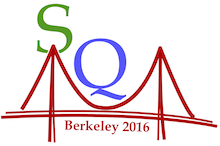Speaker
Prof.
Marina Nielsen
(Universidade de Sao Paulo)
Description
Identifying hadronic molecular states and/or hadrons with multiquark
components either with or without exotic quantum numbers is a long-standing
challenge in hadronic physics. We suggest that studying the production
of these hadrons in relativistic heavy ion collisions offers a promising
resolution to this problem as yields of exotic hadrons are expected to be
strongly affected by their structures. Using the coalescence model for hadron
production, we find that, compared to the case of a nonexotic hadron with
normal quark numbers, the yield of an exotic hadron is typically an order of
magnitude smaller when it is a compact multiquark state and a
factor of 2 or more larger when it is a loosely bound hadronic molecule.
In this talk we give particular attention to the state f_0(980)
considering it as normal quark-antiquark state or as exotic (tetraquark or
molecular) one.
| On behalf of collaboration: | [Other] |
|---|
Author
Prof.
Marina Nielsen
(Universidade de Sao Paulo)

